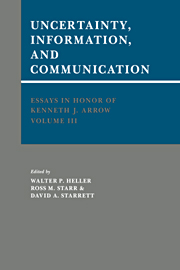Book contents
- Frontmatter
- Contents of Volumes I, II, III
- List of contributors
- Editors' preface
- Kenneth J. Arrow
- Contents
- PART I UNCERTAINTY
- PART II INFORMATION, COMMUNICATION, AND ORGANIZATION
- 7 The cost of communication in economic organization: II
- 8 Assembling efficient organizations?
- 9 Optimal Bayesian mechanisms
- 10 Incentive theory with data compression
- 11 Alternative limited communication systems: centralization versus interchange of information
- Publications of Kenneth J. Arrow
- Author index
8 - Assembling efficient organizations?
Published online by Cambridge University Press: 05 November 2011
- Frontmatter
- Contents of Volumes I, II, III
- List of contributors
- Editors' preface
- Kenneth J. Arrow
- Contents
- PART I UNCERTAINTY
- PART II INFORMATION, COMMUNICATION, AND ORGANIZATION
- 7 The cost of communication in economic organization: II
- 8 Assembling efficient organizations?
- 9 Optimal Bayesian mechanisms
- 10 Incentive theory with data compression
- 11 Alternative limited communication systems: centralization versus interchange of information
- Publications of Kenneth J. Arrow
- Author index
Summary
Introduction
This chapter is a variation on a theme by Arrow (1974), that the limits of organization are set by the need to economize on information flows, thought, committee, meetings, and infighting. It is scored for the instruments I can play: duality, profit functions, and, above all, aggregates.
Why aggregates? Macroeconomics was invented by Keynes for the management of natural economies. For that, most economists agree, one would like to deal in terms of them. Is that a reasonable possibility? Aggregation theorists say no! The condition for them to work perfectly is that everyone should behave similarly at the margin: Were there to be a single aggregate for equipment, for instance, a steel firm would change its production in the same way when given a new blast furnace as a typewriting agency given enough word processors. That seems altogether too unrealistic for them to work reasonably well in practice.
God did not make the world, then, for the benefit of macroeconomists.
It is not God but businessmen who make our large firms, commonly by taking others over, breaking them up, and selling off the pieces they do not want. Presumably they do so for their own benefit and, in particular, with an eye to ease of control. If countries would be easier to manage through broad aggregates, were this not misleading, would not large firms be, too, and would not businessmen bear this in mind in deciding what to take over and what to sell off?
It would only be one goal, of course, to be traded off against others, and only important if realistic. Hence the “?” in the title.
- Type
- Chapter
- Information
- Essays in Honor of Kenneth J. Arrow , pp. 213 - 228Publisher: Cambridge University PressPrint publication year: 1986



